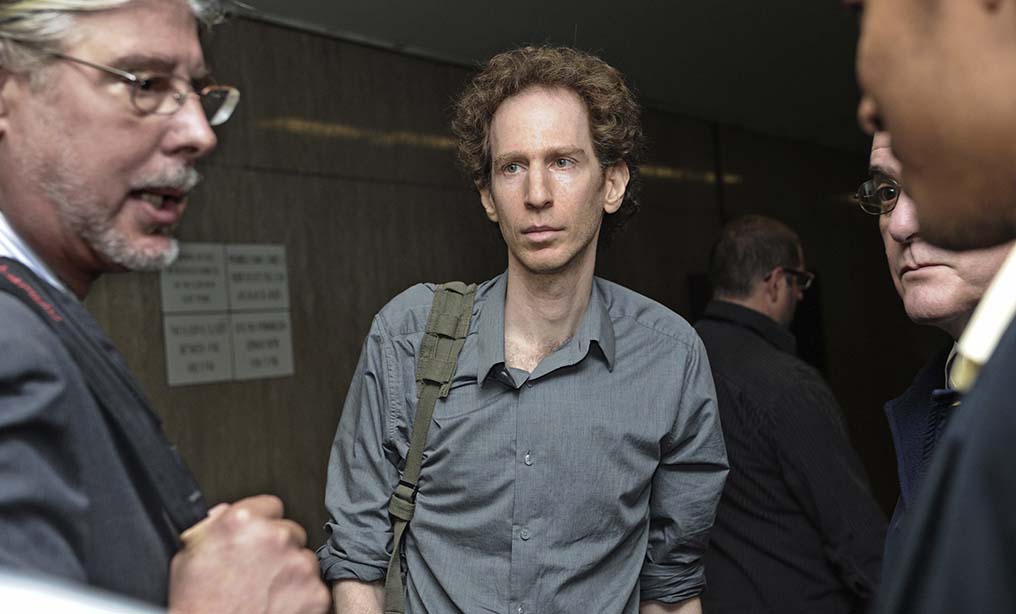Case of Dead Sea Scrolls, Online Aliases Ends With Probation
Indeed, the trial was so full of erudite references that it sometimes felt more like an academic conference, touching on the French Enlightenment writer Voltaire, the early 1900s Portuguese poet Fernando Pessoa, the Roman thinker Pliny the Elder, and more.
April 16, 2018 at 02:57 PM
4 minute read

Raphael Golb's conviction wasn't quite like any other: using online aliases to discredit his father's adversary in a scholarly debate over the Dead Sea Scrolls.
The 9-year-old case got a New York law thrown out and finally ended Monday with no jail time for Golb, who persuaded a judge to sentence him to three years' probation rather than two months in jail.
Appeals had put the jail term on hold and narrowed the counts in his criminal impersonation and forgery conviction in a curious case of ancient religious texts, digital misdeeds, academic rivalries and filial loyalty.
“Obviously, I'm relieved not to be going to jail,” Golb said, adding that he remains concerned by having been prosecuted for online activity he said was meant as satire. “The judge today did the right thing, but the whole thing should have been thrown out nine years ago.”
Prosecutors said jail was a fair punishment for a man who posed online as a prominent professor to send academically damning emails about the scholar himself.
“The [jail] sentence should stand,” Manhattan Assistant District Attorney Elizabeth Roper said.
The case began in 2008 when colleagues and students of New York University judaic studies scholar Lawrence Schiffman got emails in which he seemed to suggest he'd plagiarized the work of another Jewish history expert, Norman Golb of the University of Chicago.
The two were on different sides of an obscure but heated dispute over which ancient Jews wrote the more than 2,000-year-old scrolls, which include the earliest known version of portions of the Hebrew Bible.
But the emails weren't actually from Schiffman, who later said he spent weeks refuting the claims.
By 2009, authorities said they'd figured out who was behind the messages: Raphael Golb, a literature scholar and now-disbarred lawyer who is Norman Golb's son. Charging Raphael Golb with identity theft and other crimes, prosecutors said he'd created an elaborate electronic campaign involving blog posts and 70 phony email accounts to tarnish his father's detractors.
Raphael Golb initially argued the writings weren't a crime but parody and academic whistleblowing meant to counter scholarly scorn directed at his father and expose “unethical conduct” in his field.
Or, as Golb put it in 2010 testimony: “I used methods of satire, irony, parody and any other form of verbal rhetoric that became the type of language used by philosophers during the Enlightenment to expose the irrational arguments of their opponents.”
Indeed, the trial was so full of erudite references that it sometimes felt more like an academic conference, touching on the French Enlightenment writer Voltaire, the early 1900s Portuguese poet Fernando Pessoa, the Roman thinker Pliny the Elder, and more.
But it also was, particularly at the time, a relatively rare internet impersonation prosecution that didn't involve financial crimes.
Golb was convicted in 2010. He was sentenced then to six months in jail, a term that would be reduced as his appeals cut a twist-filled path through state and federal courts and the state Legislature.
In one turn, the case prompted New York state's highest court in 2014 to strike down an often-used aggravated harassment law that made it a misdemeanor to communicate with someone “in a manner likely to cause annoyance or alarm” and with the intent to do so. Police and prosecutors saw it as an important tool for pursuing domestic violence and other cases, but Golb and his lawyer called it an unconstitutional intrusion on free-speech rights.
The state Court of Appeals concluded the law was “unconstitutionally vague and overbroad.” The state Legislature later passed a revised version.
The Court of Appeals also dismissed some of the counts in Golb's conviction, including the only felony—identity theft—which had led to his disbarment. He was resentenced to two months in jail.
Federal courts subsequently cut some more counts, leaving a total of 10. They reflected a total of five emails sent over two days, noted Golb's lawyer, Ron Kuby.
Said Manhattan state Supreme Court Justice Laura Ward: “I think Mr. Golb has been punished enough.”
This content has been archived. It is available through our partners, LexisNexis® and Bloomberg Law.
To view this content, please continue to their sites.
Not a Lexis Subscriber?
Subscribe Now
Not a Bloomberg Law Subscriber?
Subscribe Now
NOT FOR REPRINT
© 2025 ALM Global, LLC, All Rights Reserved. Request academic re-use from www.copyright.com. All other uses, submit a request to [email protected]. For more information visit Asset & Logo Licensing.
You Might Like
View All

Courts Beginning to Set Standards for Evidence Relying Upon Artificial Intelligence
4 minute read
NY Judge Admonished Over Contributions to Progressive Political Causes

Attorneys ‘On the ‘Move: Morrison Cohen Expands White Collar Practice; O’Melveny Brings Back Corporate Finance Partner
6 minute readTrending Stories
- 1'It's Not Going to Be Pretty': PayPal, Capital One Face Novel Class Actions Over 'Poaching' Commissions Owed Influencers
- 211th Circuit Rejects Trump's Emergency Request as DOJ Prepares to Release Special Counsel's Final Report
- 3Supreme Court Takes Up Challenge to ACA Task Force
- 4'Tragedy of Unspeakable Proportions:' Could Edison, DWP, Face Lawsuits Over LA Wildfires?
- 5Meta Pulls Plug on DEI Programs
Who Got The Work
Michael G. Bongiorno, Andrew Scott Dulberg and Elizabeth E. Driscoll from Wilmer Cutler Pickering Hale and Dorr have stepped in to represent Symbotic Inc., an A.I.-enabled technology platform that focuses on increasing supply chain efficiency, and other defendants in a pending shareholder derivative lawsuit. The case, filed Oct. 2 in Massachusetts District Court by the Brown Law Firm on behalf of Stephen Austen, accuses certain officers and directors of misleading investors in regard to Symbotic's potential for margin growth by failing to disclose that the company was not equipped to timely deploy its systems or manage expenses through project delays. The case, assigned to U.S. District Judge Nathaniel M. Gorton, is 1:24-cv-12522, Austen v. Cohen et al.
Who Got The Work
Edmund Polubinski and Marie Killmond of Davis Polk & Wardwell have entered appearances for data platform software development company MongoDB and other defendants in a pending shareholder derivative lawsuit. The action, filed Oct. 7 in New York Southern District Court by the Brown Law Firm, accuses the company's directors and/or officers of falsely expressing confidence in the company’s restructuring of its sales incentive plan and downplaying the severity of decreases in its upfront commitments. The case is 1:24-cv-07594, Roy v. Ittycheria et al.
Who Got The Work
Amy O. Bruchs and Kurt F. Ellison of Michael Best & Friedrich have entered appearances for Epic Systems Corp. in a pending employment discrimination lawsuit. The suit was filed Sept. 7 in Wisconsin Western District Court by Levine Eisberner LLC and Siri & Glimstad on behalf of a project manager who claims that he was wrongfully terminated after applying for a religious exemption to the defendant's COVID-19 vaccine mandate. The case, assigned to U.S. Magistrate Judge Anita Marie Boor, is 3:24-cv-00630, Secker, Nathan v. Epic Systems Corporation.
Who Got The Work
David X. Sullivan, Thomas J. Finn and Gregory A. Hall from McCarter & English have entered appearances for Sunrun Installation Services in a pending civil rights lawsuit. The complaint was filed Sept. 4 in Connecticut District Court by attorney Robert M. Berke on behalf of former employee George Edward Steins, who was arrested and charged with employing an unregistered home improvement salesperson. The complaint alleges that had Sunrun informed the Connecticut Department of Consumer Protection that the plaintiff's employment had ended in 2017 and that he no longer held Sunrun's home improvement contractor license, he would not have been hit with charges, which were dismissed in May 2024. The case, assigned to U.S. District Judge Jeffrey A. Meyer, is 3:24-cv-01423, Steins v. Sunrun, Inc. et al.
Who Got The Work
Greenberg Traurig shareholder Joshua L. Raskin has entered an appearance for boohoo.com UK Ltd. in a pending patent infringement lawsuit. The suit, filed Sept. 3 in Texas Eastern District Court by Rozier Hardt McDonough on behalf of Alto Dynamics, asserts five patents related to an online shopping platform. The case, assigned to U.S. District Judge Rodney Gilstrap, is 2:24-cv-00719, Alto Dynamics, LLC v. boohoo.com UK Limited.
Featured Firms
Law Offices of Gary Martin Hays & Associates, P.C.
(470) 294-1674
Law Offices of Mark E. Salomone
(857) 444-6468
Smith & Hassler
(713) 739-1250






